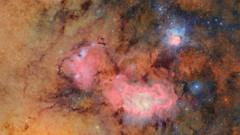With the recent passing of Apollo 13 commander Jim Lovell, only five astronauts who walked on the Moon remain. As NASA's Artemis program aims to return humans to the lunar surface, we delve into the captivating stories of these pioneers and their contributions to space exploration.
The Legacy of the Apollo Moonwalkers: Celebrating the Last of the Lunar Pioneers

The Legacy of the Apollo Moonwalkers: Celebrating the Last of the Lunar Pioneers
As the era of lunar exploration rekindles, we reflect on the lives of the remaining Apollo astronauts who made history during the iconic missions.
As humanity looks toward a new era of lunar exploration, the memories of the Apollo missions loom large. Just recently, the space community mourned the loss of Jim Lovell, the commander of Apollo 13, who safely guided his stricken mission back to Earth in 1970. With his passing, only five Apollo astronauts remain among us, each carrying tales of the incredible achievements that marked a significant chapter in space exploration history.
The spotlight now turns to NASA's Artemis program, which seeks to bring humans back to the Moon this decade. Meanwhile, China aims to establish its presence on the lunar surface by 2030, following their successful probe landing on the Moon's far side. Various private companies, including SpaceX and Boeing, are working to develop their own space technologies, albeit facing challenges along the way. NASA has delayed the launch of Artemis 2, its first crewed lunar mission since Apollo 17, now slated for 2026 due to the need for more preparation.
Among the legendary figures still alive is Buzz Aldrin, who stepped onto the Moon's surface during the Apollo 11 mission as the second human in history to do so. Aldrin's heartfelt dedication to space exploration continues to inspire others, as he advocates for missions toward Mars and pursues personal adventures at the age of 93.
Another remarkable figure is Charlie Duke, who, at age 36, became the youngest person to walk on the Moon during Apollo 16. He now resides near San Antonio, Texas, still invigorated by the prospects of NASA's future lunar missions despite acknowledging the challenges that lie ahead.
Fred Haise, a crew member of the ill-fated Apollo 13, gained unexpected celebrity status upon his safe return to Earth, despite never having walked on the lunar surface due to budget cuts canceling his scheduled Apollo 19 mission. Harrison Schmitt, the first scientist to visit the Moon, and David Scott, who led Apollo 15 and was one of the first to drive a rover on the Moon, are also among the four living Moonwalkers. Their stories reflect resilience, tenacity, and a remarkable commitment to pushing the boundaries of human exploration.
As excitement builds for the next generation of lunar adventurers, the legacies of these Apollo astronauts remind us that the human spirit is an everlasting force propelling us to the farthest reaches of our universe.



















